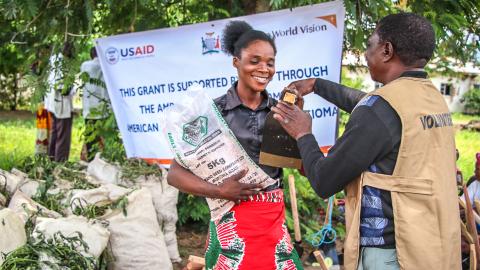
Humanitarian Emergency Affairs
What we want to do:
Vulnerable people are at the heart of what we do in Zambia. Through emergency relief, we are helping people affected by conflict and disasters (natural and manmade).
What is the problem?
Zambia has been receiving and hosting refugees and asylum seekers leaving their countries of origin in the Democratic Republic of Congo, Angola, Burundi, Rwanda and Somalia, to evade various forms of human rights violations, including targeted attacks against civilians and sexual and gender-based violence.
How is World Vision addressing the issues?
We partner with the Government of Zambia through the Commissioner for Refugees, the United Nations High Commissioner for Refugees (UNHCR) and, the United Nations Children's Fund (UNICEF), World Vision provides humanitarian support to refugees in Kenani Transit and Mantapala Refugee Settlements of Northern Zambia, to improve their health status, psychosocial well-being and their access to basic services, such as food, shelter, water and sanitation.
World Vision Zambia, through the Humanitarian and Emergency Affairs (HEA) department, works with communities, partners, and World Vision Support Offices to deliver humanitarian interventions in areas of early preparedness, emergency response, and recovery programmes.
Our overarching goal is to provide timely humanitarian assistance to the disaster-affected population through timely response for vulnerable children and their families, ensuring that they receive the needed life-saving support and protecting them from harm during disasters or conflicts.
We understand that the nature of emergencies in the country is changing. Conflicts are more vicious, complex and unpredictable. Climate change is unleashing natural disasters faster and for longer periods of time and with longer-lasting consequences for children and their families.
What’s the impact?*
In 2018 alone, World Vision drilled 53 boreholes, four mechanized with solar power and tap stands to provide clean water to 15,000 individuals in Mantapala Settlement, Kenani and the host community.
Our team in Zambia also works with the Disaster Management and Mitigation Unit under the Office of the Vice President to distribute food to drought-affected areas. In 2018 alone, World Vision Zambia distributed over 7,000 metric tonnes of food aid to affected communities worth over USD$ 2million.
For sustainability, World Vision mobilises resources for responding to disasters in-country. Our teams also work with other institutions and implementing partners to train, prevent and strengthen risk and disastrous situations.
Download the Humanitarian Emergency Affairs (HEA) Capacity Statement to learn more.